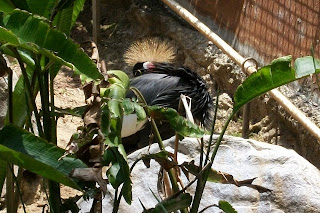 |
The above photograph was taken by the author.
|
The story I am going to tell you today is based upon a traditional
animal tale from Africa. It was adapted
from a brief version of a story found in The
Birds of Heaven: Travels with Cranes, by Peter Matthiessen and Robert
Bateman. It is about a king who likes to hunt, various African animals, and a
group of beautiful birds called cranes.
Once upon a time, a long time ago, in
a far away land, there lived an African king who liked to hunt. One day, during
a hunt with members of his court, in the land of the Blue Nile, the king became
separated from the others in his hunting party and got lost in the swirling
sands of the desert. Realizing he was lost and would soon need water, the king
began walking across the desert. He walked and he walked and he walked.
As the king was walking and walking, he
came upon a herd of antelope, and in a demanding voice, he asked them to help
him find water. “Antelope! I am dying of thirst, and I want you to help me find
water!”
The lead antelope took one look at
the antelope-skin trousers the king was wearing and replied, “We will not help
you to find water because you hunt and kill us.” And the antelope leaped off. The
king had no choice but to continue walking across the desert to look for water.
He walked and he walked and he walked.
After a day, the king came across a
herd of elephants. The king asked them to help him find water. “Elephants, I am
dying of thirst, can you please help me to find water?”
The old matriarch of the elephant
herd took one look at the elephant tusk staff the king held in his hand and
replied, “We will not help you find water because you hunt and kill us.” And
the elephants thundered off. The king had no choice but to continue walking
across the desert looking for water. He walked and he walked and he walked.
On the third day, the king spotted a
herd of zebras. He approached them and asked them to help him find water. “Please,
Zebras, I am dying of thirst, can you help me to find water?”
The zebra stallion took one look at
the zebra skin cape that the king was wearing and replied, “We will not help
you find water because you hunt and kill us.” And the zebras galloped off. The
king had no choice but to continue walking across the desert looking for water.
He walked and he walked and he walked.
Finally, on the fourth day, when the
king was sure he was about to die of thirst, he spotted a flock of cranes. Desperately,
he begged them to help him find water. “Please, please, please, dear, beautiful
Cranes, can you help me? I am lost in the desert and I need help to find water!
None of the other animals I met would help me!”
The cranes looked him up and down, saw
that he was indeed dying of thirst, and that he had been wandering for many
days. They also took note of the fact that the king wore nothing made from
crane feathers. The leader of the cranes nodded, and all of the cranes flew
off.
Dismayed, the king cried out, “Oh,
they won’t help me either!” But, just then, the cranes returned, each of them
with a crop full of water for the king to drink. When he was finished drinking,
several of the cranes lifted the king up into the sky and carried him to a
nearby oasis, where he was reunited with the other members of his hunting party.
The king was overjoyed and very
grateful. To thank the cranes for their acts of kindness, the king gave each
one a golden crown to wear so that everyone would know how they had helped a
king.
The next time the king saw the cranes,
however, they were not wearing their golden crowns. When the king asked them why
they were not wearing their crowns the lead crane answered, “The other animals
were so jealous of us that they stole our beautiful, golden crowns from us.”
This made the king very angry and so he
ordered his court magician to create crowns for the cranes that no other animal
could ever take away from them. The
magician waved his magical staff and touched each crane on its head. Abracadabra!
Where the magician touched the cranes, gold-colored feathers sprouted. Thus he
created beautiful crowns that could never be stolen from the cranes.
 |
| Photograph taken by author. |
Conclusion: These were the first African crowned
cranes, and, to this day, the African crowned crane has a magnificent, golden crown
of feathers on its head. And, so, you see, a good deed will be rewarded. [And,
perhaps, the king should think better next time before hunting and killing animals for their
skins and ivory.]



